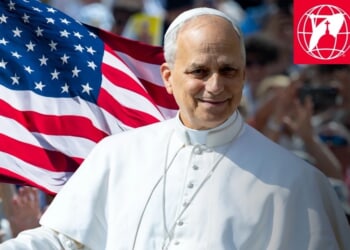Editor’s Note: This is the last of nine episodes of Scott McKay’s forthcoming novel Blockbusters, offered in serial form as an exclusive to The American Spectator readers in advance of its publication in October. Blockbusters is the third novel in the Mike Holman series; the first two, King of the Jungle and From Hellmarsh With Love, were also serialized at The American Spectator prior to book publication.
Mike Holman, the protagonist in the series, is an independent journalist who’s been called The World’s Greatest Newsman. But in Blockbusters, he’s literally going Hollywood — choosing to head up a campaign chiefly funded by Pierce Polk, Mike’s long-time friend and one of the richest men in the world, to reform and save American and Western culture.
Starting with an attempt to fix the film and TV business.
In Episode 8, the revolution Mike and his group have touched off by buying struggling production and distribution nodes in the film industry has now gotten well underway. But the final victory depends on cracking the control of the Big Five media conglomerates – and that leads us to our dramatic finish…
Englewood, Colorado – September 1, 2025
By the time I made that trip to Baton Rouge, I’d been banned by the crew at PGFI’s offices from flying commercial, something I’d been pretty insistent on doing whenever I could.
It wasn’t that the team was a bunch of elitists or anything. It was the threats.
There had been a steady stream of calls into PGFI’s offices for the whole second half of August, saying there was a bomb on the first floor, or that there was anthrax in the AC vents, or that we’d be picked off as soon as we came out of the front door on our way home. These weren’t really the kinds of things we’d take seriously, as nerve-wracking as they were, and we knew why they were happening.
There was a hashtag on X that trended pretty much every time we did something that got into the news cycle. “#GetHolman” was appended to some of the nastiest, sickest stuff you could imagine. These people were actually fantasizing about ways I could be killed.
But I’ll give them credit for being artful. Nothing posted under that hashtag was a definite threat. They were all what-ifs and hypotheticals, the kind of thing you could kinda-sorta pass off as a joke or a passive thought experiment if the Feds came and knocked on your door.
But it really freaked PJ out that this thing continued even after I emailed Elon and asked him if there was some sort of way to shut this thing down. And when the FBI actually arrested one guy for posting a “fantasy” of blowing my head off with a Daniel Defense Delta 5 Pro rifle and adding an image of the front door of my house, and when they found out who he was it turned out he’d recently bought a Daniel Defense Delta 5 Pro, Elon finally did step in and put a stop to that hashtag.
So instead, they moved it to Bluesky, where it continued unabated.
And Sentinel Security descended on our neighborhood like an invading army.
There was a big town hall meeting at the Club at Admiral’s Cove and Rhett Magness, a former Navy Seal commander who was the regional VP for Sentinel Security in South Florida, got up and spoke about the threats to PJ and I and apologized in advance for the presence their guys were going to take up in the neighborhood in defense.
“We’ll be watching at the entrances to Admiral’s Cove,” he said, “and we’re going to be patrolling Lake Worth Creek in a couple of boats. Additionally, we’re going to have drones flying over the neighborhood 24/7. You’ll notice us, and it’s possible you might find us interacting with you. If that’s an inconvenience, I do apologize.”
“And I apologize in advance,” I said, “because it seems we’ve inflicted this on you and you’ve done nothing to deserve it. The good news is this might just be the safest neighborhood in the free world and with no resulting increase in your HOA dues.”
There were laughs, but I could tell that some of the neighbors were none too pleased.
“I don’t know why you don’t just move somewhere else,” said an old woman I didn’t know. “They know where you live, so just go.”
“Oh, shut up, Mildred,” said Stan. “Mike and PJ have done nothing to you, and they’re not asking you to do anything.”
“They’re just explaining the extra security,” said Helen Rawls, whose husband, Red, a big natural gas guy from Ohio, had died back in the spring. “Try not to be so selfish.”
“I am NOT selfish!” Mildred exploded in her Boston brogue. “I volunteer at the Coastal Equity Alliance, I’ll have you know. And besides, your drones scared my Persians!”
The crowd mostly laughed at her, but the meeting devolved from there, and before long, most of the attendees had made their way to the bar for the late open-bar happy hour PGFI was sponsoring.
And yes, Mildred was in that bar sucking down her trio of appletinis. I had to talk PJ out of confronting her.
With all of that going on, the idea of flying commercial just seemed reckless.
Which was something Roman explained to me in no uncertain terms.
“I hope you don’t mind,” he said, after I let him in the morning after that meeting at the club, “but I’ll be taking over your life from now on.”
“Oh, come on,” I said.
“Sorry, but this comes straight from Pierce. He was pretty clear. ‘Roman, don’t let those psychotics touch a hair on his head.’ So you’re stuck with me.”
Before I could say anything, PJ rushed past me and gave him a massive hug. “Oh my God!” she squealed. “The cavalry is here!”
I wasn’t sure what to make of that. They both looked at me, and I looked at them, and PJ sort of slinked away from Roman and came over to my side and kissed my cheek.
I just gave an uncomfortable scowl, and I could tell that at that point, Roman was even more uncomfortable than I was.
“OK,” he said, “Let’s start over.”
“I’m not saying no, Roman,” I said. “I get it. There are crazies out there, and I have a pregnant wife to protect. We do need security.”
“Right, but you also have a life to lead and a job to do. I’m here to make sure that’s possible without making you a soft target.”
“So how are we going to do that?” PJ asked.
“Can I commandeer your pool house, or do you need it?”
“Well, PJ’s mother has been staying there, but it’s not a problem. Mary can move into the house.”
Mary was working out of the PGFI office that morning. She’d had an early meeting with the British trade ministry, attempting to smooth through some issues surrounding a liquified natural gas deal the Guyanese government was concluding with the U.K.
“Good,” said Roman. “I’d recommend that anyway. We’ll move her into one of your guest bedrooms, and then we’ll have a smaller perimeter to defend. But I’ve got some bad news, which is that you’re going to have some crews in here later today, and it’s going to be a disruption.”
“What now?” I asked.
“All of this plate glass has to be replaced.”
“Why?”
“I told Pierce four years ago that it needs to be bulletproof, and he refused to listen. But you won’t.”
“Fine. Do it.”
“It’ll all be replaced by 6 this evening. The specs are already on file, and the glass was ordered last week.”
“What else?”
Roman looked down at Robby, who was pawing at his pants leg.
“You, little man, are gonna get some brothers. Maybe they’ll teach you something.”
“You’re bringing us dogs?”
“I am. Robby’s new pals are gonna be a couple of Dogo Argentinos. We breed ‘em in Liberty Point. Best damn guard dogs in the world for my money.”
“They’re not going to eat him, are they?” asked PJ.
“They might make a man out of him, but no.”
She wasn’t crazy about that answer.
“I’m kidding. They’ll leave him alone. You and Mike they’ll love. Everybody else that you don’t introduce to them, they’ll tear the SOB’s throat out.”
PJ sighed.
“You OK, honey?” I asked her.
“Why does it always come down to Roman bailing us out?” she whined.
“Well, maybe because he’s good at it?”
“PJ, it’s an honor. Really. What you guys are doing is a big deal. If I can help in a small way, and I suppose this would be that, it’s, you know…”
“Movie rights,” I said. “That would be a big way.”
“Don’t you put that evil in my ears, Mike Holman!”
With that, our lives changed.
Roman brought two guys with him from Liberty Point. One was Handsome Rob, the prison guard from Belmarsh who helped to bust me out of that shithole last year. PJ really liked Handsome Rob — I did too, but she thought enough of him, remember, that she’d named our puppy after him.
And she introduced the two.
“‘E’s kind of a pouff,” said Rob, in his cockney accent. “Half a poodle, he is.”
“Stop it,” she said. “He’s beautiful!”
“‘At’s the problem, love. Wot kind of guard dog is he, then?”
“The peeing kind,” I said. “But he does bite a little.”
“He does not bite!” PJ said. “We broke him of that!”
“Not much to work with, are you, Robby?” said Handsome Rob, squatting down to look his namesake in the eye.
Robby lunged forward and licked him on the nose.
“There’s the natural aggression of the American goldendoodle,” I said.
“Aye,” said Handsome Rob, wiping Robby’s drool off his face. “Puts the fear of Jesus right in the villains, he does.”
Roman made himself my bodyguard. He went with me to Baton Rouge, and he was with me when I flew to Atlanta afterward.
Diego Reyes, whom Gardocki had brought in as PGFI’s director of operations when Melissa finally complained she was overwhelmed as my assistant, had taken over as the booking agent for my travel. Diego hooked us up with a NetJets account, but Roman shortly nixed that in favor of a dedicated jet rental. It was a Gulfstream G280, operated by a company out of Houston that he was familiar with.
“It goes where we go,” he said. “I don’t want to take the chance of flying with people we don’t know.”
So when we got on the G280 in Baton Rouge and landed in Atlanta, there was a Sentinel Security Humvee that took us to the Holman Media headquarters.
I was there to meet with Megan Rivers because she was doing the PR for PGFI. Megan had hired up a team of eight people to handle our stuff, and she’d moved her office to the third floor of our building, which had formerly been an insurance brokerage.
But after we did that, Colby Igboizwe poked his head into the conference room.
“Can I talk to you?” he said.
“Of course. I was coming down to see everybody, though. You didn’t need to go out of your way…”
“Look,” he said, pulling me aside. “That movie app of yours? I want in.”
“OK,” I said. “Of course. But why?”
“Betrayal of Blood.”
“What’s that? You have a movie you want to make?”
He nodded.
“About what?”
“The Asante Empire. Those were the sons of bitches who caught all the people in West Africa and sold them to the Europeans on the boats. I want to do a movie about how they were the ones really in charge of the Atlantic slave trade. And I’m not going to show a single white face in the whole movie.”
I just looked at him.
“What?”
“Do you have a death wish? You want to get us all killed?”
“Ain’t a lie gonna be told, Mike.”
I just laughed and shook my head.
“Don’t tell me you’re losin’ the sand, boss.”
“Well, I’m not saying no. I am saying I’d like the death threats to die down before we announce you’re going to say it was black people responsible for slavery.”
“Oh, wow. Et tu, Mike-eh?”
“Stop it. PJ is six months pregnant, and we now have bodyguards camped out in our poolhouse. Intellectually, I’m with you. Practically, I need some time.”
“All right, that’s fair. But this is a passion project of mine.”
He wasn’t lying. In January, Colby had done a podcast on the Asante, and the fact that kente cloth was sort of a trademark of theirs, and all the Afrocentric idiots brandishing it were actually glorifying the sales agents for the Atlantic slave trade. That thing had gone more viral than COVID.
From a commercial standpoint, we were certainly a go on his project. And with CASTR, we’d definitely be able to bypass one of the biggest problems a production would have, which is that you’d have a hell of a time finding people willing to work on it. Colby could literally do it himself with a little help, which is what he was saying he wanted to do.
And he was one of my best friends. Of course, the answer was yes.
“So look,” I said. “What you should do is get on a flight to Baton Rouge and go see Billy Slaton at Surge Vision. Explain to him what you want to do, and he’ll set you up.”
“You’re the best.”
“Yeah, you won’t think that when you’re finished with that thing, and I wet my pants over whether we’ll let you release it.”
“We’ll burn that bridge when we come to it, Mike.”
Then we took the plane to Denver. I had a meeting with the soon-to-be Blockbusters team.

We were all in Denver — well, Englewood, which is outside of Denver — to announce the launch of Blockbusters, which we’d ultimately agreed would be the all-in-one consumer-facing brand that encompassed everything we’d put together so far.
Englewood was where Flying Saucer’s headquarters had been, and Fling TV and Jump Mobile were on that campus as well. Pierce’s guys had rolled in and done a full-scale corporate reorganization, moving people around from a number of Sentinel entities and merging them with the existing folks from Flying Saucer’s component parts.
And by the beginning of September, thanks to a little ironclad NDA and a lot of money paid to the Flying Saucer folks who hadn’t made the Blockbusters cut, we were ready to launch this thing largely to the complete surprise of the general public.
Even to the surprise of the media industry.
I served more or less as the master of ceremonies for this little event, which kicked off right after we’d served up a big luncheon for all the local swells and a wide assortment of news media.
“Howdy, everybody,” I said, stepping to the podium in Flying Saucer’s sizable atrium. “As you might know, I’m Mike Holman, and I am in fact a flesh-and-blood human being and not just a Zoom avatar as you might be tempted to believe.”
There was a smattering of laughter, but that wasn’t my best joke.
“We’re all here,” I continued, because something is happening today. Something historic. Most of you have seen the video of a speech my friend Pierce Polk gave a few weeks back, talking about the two revolutions we’ve had in media in the modern age. First was something akin to the Russian revolution, and that was the birth of the mass media age in the 1920s and 1930s — it signified a major shift from what had been the previous iteration of media, which was books and newspapers. It was like the Russian revolution, not so much because the communists won, though…”
I paused for effect, and the crowd gave a low collection of chuckles.
“Why Pierce called it a Russian revolution is that what resulted was a very top-down system that was tightly controlled by a small number of people who enjoyed an awful lot of prosperity, which the large majority of people in the industry had no access to, or power to affect.
“And that lasted for about 80 years before it was impacted by what Pierce likened to the French Revolution, which was the social media revolution. Like the French Revolution, that upheaval promised a lot — liberty, equality, fraternity — and instead what happened was once again a very tight oligarchy which exercised an oppressive amount of control over what should have been a very free system.”
I could tell the crowd was ready for me to get to the point, which was good, because here it came.
“But what we’re here to signal today is an American Revolution, on a host of levels,” I said. “Most specifically for our purposes, is that this media revolution seeks ordered liberty and a breakaway from the tyranny of the few. What will flow from this gathering will ultimately be an ecosystem that leverages a whole new age of technology, which will ultimately unleash the creative spirit of ordinary people like nothing the world has ever seen, and I predict it will do for the media space what the American Revolution has done for human freedom and global prosperity.
“And now begins the first shot fired in that revolution.
“Today we’re announcing the formation of Blockbusters Media, a multi-disciplinary media company owned by PGFI Equity Group in partnership with several capital partners, among them the Guyanese sovereign wealth fund, the Bald Eagle Fund, Mainsail Capital, and others. Blockbusters Media will fulfill the vision of the Polk Global Freedom Initiative to reform and revitalize a muscular, vibrant, confident American culture based on an entertainment media that seeks to produce great art that enforces and reaffirms our shared values rather than challenging or upending them. We seek to operate within a Judeo-Christian moral context, which is not to say that all of Blockbusters’ intellectual property will be religious in nature. But we also won’t reflect the woke mindset that so much of Hollywood has governed itself under for far too long.
“The public has made it clear that they’re sick and tired of wokeness. There is a flowering of traditional American values afoot, and we mean to keep that going. You’re beginning to see that in some of the offerings from the Blockbusters entities, which have already made their way to the public eye.
“For example, in the runaway smash summer hit Desert Odyssey, directed by Chris Santiago and starring Parker Stone, who lives not far away from here.”
Santiago and Stone stepped forward and accepted a standing ovation from the gathering.
“Or the upcoming streaming series The Hoodrats, written, directed, and produced by the amazingly talented Derrick Washington.”
I waved Derrick forward, and he also got an ovation.
“Or Redemption Run, another streaming series written by Bradley Crain, directed by Armando Iannucci, and starring Ryan Gosling and Sydney Sweeney.”
The Redemption Run folks stepped forward for their ovation.
“And finally, this fall’s sure-to-be mega hit Dominus Rex, written by Ted Mirabellas and starring Chris Pratt, Michael Imperioli, and Georgia Stroud.”
More applause.
“That’s just the beginning. The studios and production houses we’ve set in place are poised to bring more creative content to the film, TV, and recording space than anything the world has ever seen, and we’re just getting started. We’re here to announce that a cultural renaissance previously unimaginable is now here.
“But why are we in Englewood? Because the people in this room are its nexus.
“Blockbusters Media will ride on the tech backbone established by the Flying Saucer Network, in tandem with the communications assets of Sentinel Telecommunications. Those were merged in a deal earlier this year, and they combine to create a data network that can deliver a faster, more robust stream of information, communications, and video and audio media than anyone else in the world can claim. Let me introduce Mark Green, the CEO of Sentinel Telecommunications, who will tell you about that backbone.”
And Green did, without putting the folks to sleep. He talked about how the Shining Star network could deliver 300 Mbps downloads anywhere in North America in virtually any conditions, for a mere $99 per month.
“And all subscribers to the Shining Star network,” I said, “will have free access to Blockbusters Media — which will, in short order, be the most robust content streaming service mankind has ever known.”
We then played a snappy video presentation showing the revamped Fling TV interface, which was now the Blockbusters interface, that included all the old Fling TV channels, plus all of the Blockbusters offerings — from Belmarsh and Surge Vision and Sunshine, not to mention a host of legacy channels. But everything was streaming; nothing was on a schedule except for some of the independent news channels and some of the other cable networks who’d signed up to be part of Blockbusters’ platform.
The list of offerings was nonetheless vast. Music, news, movies, TV shows, sports — to get all of this for free simply by signing up for faster internet than the cable company could offer, and to have it bundled with a club membership at the Movie King by Blockbusters locations was the best deal anybody in America was offering.
The presentation lasted 40 minutes. It was carried live by most of the business news channels. And by the time it was over, it had utterly crashed the stocks of the Big Five media companies.
Summit was trading at a little over $13 in the morning of September 1. By close, it was below $7. Stine-Warmer sat at just under $15 in the morning; it fell to just above $8. Castcom went from around $26 to $15.
And Sidney’s battered shares fell from $38 to $23 in one of the worst collapses of an American stock since 1929.
By the market’s close that day, which the legacy corporate press histrionically called the Red Wedding, Numakin had rushed in to backstop those stocks with Bald Eagle, as had Stan and Trent with PGFI. They’d lined up lots of friends.
And when the smoke cleared, our syndicate controlled the majority of the shares in each one of the companies in question.
Peter Chang was cornered by a reporter from KRON-TV in San Francisco, asking him if he had any reaction to the massive reversal Dragon Harvest America had just suffered before they could consolidate their merger with Summit. He shoved the camera and literally spat on Mindy Nguyen.
Logan Rudolph dropped an F-bomb amid a string of expletives on Chad Langley from Bloomberg when he was asked, outside the Metropolitan Club in Manhattan, about Stine-Warmer.
Rod Igor went into seclusion at his place in Aspen and would issue no comment. And Don O’Henley was unavailable, as he was meeting with associates in Davos at the time.
But Trumbull called a press conference and addressed what had just happened.
“This has been coming for a while, honestly,” he said, after a quick preliminary discussion of the carnage in the market. “Media in this country, I don’t need to tell you, is sick. It’s sick. And the money reflects that. So now you have something new — it’s a new model, to tell you the truth, and nobody’s seen anything like it.
“But — and I’m a free-market guy, and I always have been, we’re going to need to take some steps to make sure that the media stays free and American. And now that we’re sifting through the wreckage of what just happened, it’s time to ensure that the media isn’t controlled by a small number of people. That’s been a problem for a while, actually, and we can’t let it get worse.
“So I’m directing the SEC and the FCC to sit down with my friends at Bald Eagle and PGFI, and we’re going to supervise a very orderly, very equitable selloff of all the assets they’ve just acquired. What they did was incredible. It’s incredible. They just cornered the market on American media like it was Rockefeller or Carnegie or Vanderbilt, and good for them.
“But you can’t keep it. You can’t.”
We flew back to North Palm Beach that night on the G280. Roman kept looking at me.
“What?” I finally said.
“I’m in fuckin’ awe, dog. Awe.”
“Stop it. You’re not in awe of any man.”
“Nah, man. What you’ve done? Genghis Motherfuckin’ Khan.”

Washington, DC – October 4, 2025
It was weeks later when we had a major development — and a massive scoop for Holman Media.
“We found her, Mike,” was all I could make out.
“Flip?” I barked into the phone. “You broke up a little; this connection is terrible. Where are you, anyway?”
“Hang on,” I could hear him say. “How about now?”
“Yeah, that’s better. Found who and where?”
“Shawna! Shawna Doyle! And we’re in Rangoon.”
“Myanmar? Are you kidding me?”
He’d emailed me the previous week that after months of trying to track down the poor girl’s whereabouts, they’d had a break in the case. Facial recognition software at the airport in Calcutta had delivered a hit of not just Shawna but of the guy roughly handling her through the terminal, and Sentinel Security’s tech team managed to trace him through credit cards and other means.
But Rangoon? That was new.
“Yeah, man,” said Flip. “It was crazy. They had her on the top floor of this especially shitty tenement building. She ended up with this Triad lord over here; the poor girl had been handed around maybe a half-dozen times to some of the worst scumbags imaginable.”
I knew some of the story from Flip’s progress reports; all of it I thought too depressing to share with Misty and Georgia — who, at the end of the day, never really expected much in the way of results. Now, I hoped, we’d be able to give them a happy ending along with the horror.
“Well, how is she? Do you have her?”
“Hell yeah, we have her. We’re on the way to the airport right now. She’s dehydrated and she needs a good cleaning up, and it looks like she’s been roughed up a little, but I think physically she’ll be OK.”
“Wow. Great news.”
“All right. I’ll call you when we get back to the States. But I thought you’d want to know.”
“Yeah, buddy. Can’t wait to see your report on this.”
Flip had it up the next day at the Holman Media site and on the brand-new Holman Media Blockbusters streaming channel. They got Shawna cleaned up on the plane, and she was excited and talkative and could speak clearly, which was a miracle, I thought. She confirmed it was Clark Kale who procured her; he took her to a party on what she thought was a date, though she didn’t know at whose house, and she dropped from the face of the earth.
“All I know is I was somewhere in Bel Air,” she said, “and then my next memory was I was half-naked in some dark room with three other girls.”
That was in Mexico, in a little town outside of Cabo San Lucas. After that, she spent eight months in Macao, under the thumb of a Chinese underworld figure she only knew as Yao, until he lost her in a card game to a Kazakh opium tycoon, who then sold her to a Pakistani playboy who did not treat her well. The Pakistani’s father insisted that he dispose of her, which he did, selling her to an oil pipeline magnate from Azerbaijan, and the next thing she knew, she was being hustled to Rangoon.
But Flip and Charlie Hudson, who was one of the baddest asses that Sentinel Security had and who had been with Roman on the jailbreak mission in London, managed to locate the building where they’d brought her by geolocating the Triad guy’s phone. And Charlie simply showed up at the front door of the place, gave his business card, and asked to see the boss.
They didn’t take him up to see the boss. The boss came down, holding Charlie’s business card.
A very respectful conversation ensued, and the boss, in reasonably passable English, told Charlie that as a favor to Pierce Polk, it would be his “preasure” to remand Shawna into the custody of Sentinel Security.
They say the Triad bosses in Myanmar are just about the nastiest humans alive, but these guys still wetted their pants when Sentinel came calling. There’s something to be said for that.
So that story ended well, but not exactly perfectly. Because by lunchtime after the Holman Media piece was posted and streamed, Clark Kale did a header off a 15th-floor balcony at the Conrad Hotel in L.A. — and with him went any real hope of knowing who Kale had trafficked Shawna to.
Or any concrete evidence tying her kidnapping to Blondheim.
Trumbull’s new U.S. Attorney in Los Angeles did publicly state they were investigating not just Blondheim but the entire Boys’ Club ring, and promised to get to the bottom of sex trafficking in Hollywood. And Shawna and Flip signed a rights deal with Surge Vision to produce her story as a series. Last I heard, they were talking to Matthew Modine to play Blondheim. Shawna was going to be played, obviously, by Shawna.
So it was a win, if not a complete win.

What was a complete win was Dominus Rex and the billion dollars it made in the first two weeks after it was released. Practically every church in the world rallied its parishioners to see it after the Pope had called it a brilliant bit of Christian lore.
And they were utterly, completely stunned by how good Georgia was in it. When I say she was an overnight superstar, I’m not doing it justice.
Nachman had his own ideas for marketing it. He bought digital billboards all over the country, and he just had an extreme close-up on Georgia’s face with “Dominus Rex: at a theater near you” lying over it. The look she gave in that shot was so striking that people couldn’t get enough of it. When that image hit Times Square in New York, people were sharing selfies they took with it in the background all over social media.
It was an amazing, amazing triumph. For Georgia. For Santiago. For Pratt. For Bradley. For Nachman.
And probably most satisfying for me, for Ted and Stella Mirabellas.
Because those people who had roundly trashed him and tried to cancel him all those years ago were suddenly having to kiss his ass for having created this thing, the biggest motion picture sensation in maybe a decade, and without even a major studio behind it.
As for Shining Star, it was a win, too. But publicly, we had to take a loss.
We had to take a loss because corporate media went absolutely off the rails over the fact that their entire industry had just been consolidated into hostile hands, or at least what they considered hostile hands. Most of the country really didn’t care; in fact, public opinion polls were more favorable than not, and Megyn’s narrative got traction, which was that what PGFI, Mainsail, and Bald Eagle, among others in the investment group that came together for the Red Wedding, had done was to save mass media.
But 40 percent of the country called themselves undecided on the issue, and Pamela Farris, newly deposed from her job as CEO of Summit, was all over the airwaves complaining about the “fascist curtain” descending on media in America.
We hadn’t even fired anybody yet.
Well, OK. Jimmy Kimmel. I’ll give you that one. That happened the day after the Red Wedding. But he got a $22 million severance package, for crying out loud. Let’s not tear our shirts too much over that.
The point was that Trumbull turned a little squirrelly with so much at stake.
And Numakin, who’d been integral to our efforts all along, broke from our coalition and essentially sided with the administration against us.
Maybe this was his plan from the beginning. If it was, and I suspect that it was, Bernie Numakin’s reputation is very well deserved.
I could regale you with the blow-by-blow of the negotiations that took place at the Naval Observatory in Washington. On one side, it was Pierce, Stan, and me, representing PGFI; Todd McIntyre and Harrison, representing Mainsail; Barry and Dan Allison, the father-and-son team from Delphi Microsystems who’d thrown in almost $50 billion for the Red Wedding; and the Las Vegas entertainment mogul Hiram Goldstein, who also backed our play.
But on the other it was the Federal Trade Commission, the Commerce Department, the attorney general, and the SEC. And Numakin, who was, I thought, going to be on our side of the table. He made it especially clear that would not be the case.
“As I told you from the start,” he said, “the sovereign wealth fund was always my priority. But we’ll continue to do great work together.”
That was probably the friendliest declaration of war I’ve ever heard.
A few other people were there, mostly representing the entities who’d lost in the Red Wedding. Peter Chang was expected to be there to represent Dragon Harvest America, but at the last minute, they pulled out of the negotiations.
And Peter essentially disappeared. Kevin had managed to buy some of Chang Pan-Pacific’s old assets with capital Hank had helped him raise, and he was reconstituting the company along what he said he hoped would be more ethical lines.
We got killed in those negotiations. Bald Eagle won them going away. Numakin managed to secure a 50.1 percent stake in both Shining Star and the holding corporation, the assets of those Big Fives had been placed in. And they did it by buying out the other investors… on promissory notes.
We would get paid off out of the proceeds from unwinding Federal Media Holdings, which would happen in a series of IPOs of the media properties those Big Five companies had owned. Broadcast networks, cable channels, film production companies, telecom assets, TV stations, everything was broken down into tranches and scheduled for spinoffs.
We managed to get the IP library of Summit, Stine-Warmer, Castcom, and Sidney for Blockbusters, and for three years rather than two. That was a win. But after that, it would revert to Bald Eagle, under the oversight of a board appointed by the president and confirmed by Congress. At least we’d get to set up the rules for how that library could be used, which was a big deal for me.
Breitbart had my picture atop a big story they did with the headline “Holman: No More Awful Woke Remakes Of Classic Films.” Stan got a screenshot of it and had it printed up in a large format to hang on the wall at PGFI headquarters.
At least, not for three years. After that, it was more about politics than culture. But it was largely out of our hands at that point.
It’s not like we lost money or anything.
Stan and Gardocki did a 10-year estimate, and they projected that between PGFI and Sentinel Telecom, we’d make $16 billion from our part in what Shining Star would become. Bald Eagle would net four times that, naturally, but it’s like Pierce said: “Hey, we’re negotiating against Bernie Numakin with the federal government standing behind him. We’re in no position to complain if we get hung out to dry a little.”

Then there was the ordeal at the House Oversight Committee, where we had to explain what we’d negotiated. That got especially acrimonious, especially when Ulric Swallows, an obnoxious Democrat from L.A. who was owned either by China or the Mexican cartels or both, lit into Numakin and me.
“Look, Congressman,” I said after an extended harangue that ended with a non-question question. “You’re going to need to accept the fact that the status quo, which nobody other than you and your friends liked, is over. It was always going to fail, and it has. All industries get disrupted. Why would film and TV not be? Technology changes, tastes change, and talent changes.
“The vision that we’re imposing, and we’ve got buy-in from the administration on this, and I’m supremely confident that when the public sees what we’re doing, we’ll have full public support as well, is built on the idea that pop culture belongs to the creator and his audience. Not to the middleman. But the institutions that’ve been exercising control over our culture have been run exclusively for the benefit of the middlemen since the inception of mass media.”
“That’s ridiculous,” said Swallows. “You’re simply shilling for your billionaire pals.”
“Oh, and you aren’t? You’re not a pawn of the institutional capital firms and the corporate suits in Hollywood? Should we check your donor list again?”
“I’m reclaiming my time!” Swallows bellowed.
“Turns out your time is up,” said the chairman. “Let’s turn this over to the gentlelady from Florida.”
“I get the impression Mr. Holman has more to say on that last question, so I’ll let him finish.”
“Thank you, Congresswoman Smith,” I said. “What I was going to say is that in this new era of media, which has just begun, we’re going back to the basics. There’s the storyteller and the audience. Nothing else is really important at the end of the day. And with the technology coming online now, we need much less insulation between the two, so we need a matrix of cultural institutions allowing for the easiest dissemination of the stories we tell each other. And that means fewer giant corporations controlling our media, entertainment, and otherwise. We saw already that the public isn’t interested in that model anymore, and so we decided to break it when we had the chance.”
“But by breaking it, you’ve set yourself up as the new model, are you not? I mean, you’re running this new model and you control it all.”
“Well, now, wait. We’ll have a whole ecosystem of companies competing for the attention of the people and the revenue that attention carries. And Blockbusters will be one of them, but it’ll have a little more to it than that. We’re offering it free on the Shining Star platform for two years, which is a favor to the American people in that one, it’s going to be a terrific repository of entertainment for the masses and two, it’ll attract people to a broadband communications network the proceeds from which will help pay down the national debt, and in consideration for that favor Blockbusters is getting to manage the libraries of the former Big Five media conglomerates during that two years and then a year after that.”
“For what purpose, Mr. Holman?”
“We want to set a standard for stewarding the classic intellectual property of our culture,” I said. “We want to put an end to woke remakes and sequels. We want to keep our cultural patrimony from getting abused and distorted.”
“So you’d make the Snow White remake illegal.”
“Well, not illegal, but we wouldn’t allow somebody to bastardize the original IP like that and still call it Snow White.
“And it’s not like we’re going to rule with an iron fist here. If somebody wants to license the great classics of American storytelling in film to retell those stories respectfully, then we’ll enthusiastically agree. But if you want to turn the classic movie about the Battle of Midway into a Chinese communist propaganda film about how cool the locals were to Doolittle’s raiders when they landed the planes, the answer is no.”
“If I may,” Numakin jumped in, “Mike is more the creative force here, and I’m just the money guy. But speaking for the Bald Eagle Fund, which you in Congress have chartered as our nation’s sovereign wealth fund, I’d like to point out that we stepped in to save the stock of these companies from utter collapse, and in one or two cases from a possible foreign takeover. And while we wanted to prevent too much damage to ordinary Americans’ retirement accounts, our primary motivation here was to acquire a large chunk of our cultural patrimony that could be used for the benefit of the American people — namely, to pay down our national debt so that we don’t lose our prosperity.”
“Without which we won’t be able to reward the next generation of talented people for making great art,” I said.
I even managed to keep my cool when Jasmine Crockett suggested we were racist because there were no black people involved in PGFI. I told her she was really going to lose her mind next year when Colby Igboizwe’s Betrayal of Blood series showed up on the Holman Media Channel in the Blockbusters app.
It went on for a couple of hours. Honestly, I expected a whole lot worse reception.

The country hadn’t really figured out what it thought of all this, and of course, all of the status quo media figures were just howling over the takeovers.
Seth Meyers did a very unfunny bit about how Pierce Polk’s guys were going to come and arrest him; Megyn put out a press release noting that it wouldn’t be an arrest but rather an escort out of the building seeing as though his show loses $25 million a year, and we couldn’t successfully spin off the network with that kind of dirt on the ledger.
And I did an interview on SBS’s Morning News show the next day, which was an embarrassment. Rita Courson, the host of the thing, snarked that “I guess I have to call you boss now.”
“Yeah, I guess you do, Rita,” I said, surprised at the sneering disrespect. “I know that’s probably jarring for you. But I’ve been where you are, so I sympathize.”
She went on and on about what was going to happen to all of the producers and techs, and other little people in their newsroom without a big corporate daddy backing them, and wasn’t our planned spinoff going to do irreparable damage to them.
“I suggest you guys call my folks at Holman Media,” I said. “We have a decent-sized staff over there and they’re all very happy. In fact, when I first broached the idea to them that PGFI might acquire one of the big media organizations and plug the company in as a replacement for the network news organization, do you know what they said? They said, ‘Please don’t do that to us.’
“They liked the idea of independence and the integrity that went with it.”
“Are you saying we don’t have integrity at SBS?”
“Well, I don’t want to be rude, so I’ll just say it like this — your ratings and public opinion surveys indicate that you have bigger problems than my view of that subject.”
Those appearances, and there were a lot of them after the Red Wedding, were a highlight. We’d managed to displace the people doing all the damage to the culture.
Which was exactly what we came for. And there was a special bit of satisfaction in knowing we’d built something better.
The Blockbusters streaming platform, which debuted with 11 million subscribers, hit 50 million within a month and 150 million in two months. It was a revolution. It was like an internet for streaming media, with an almost unlimited amount of choice, and all of it was on demand. The interface was intuitive, but the Blockbusters app was also comprehensive in how it taught folks how to use it. Press a button on your TV, remote, touch a part of your phone’s screen, or mouse-click on a button on your computer screen, and you’d get a video tutorial telling you how to do whatever it is you were looking to do.
And the tutorials were a trip. You’d have Humphrey Bogart explaining how to add channels to your subscription. Gene Hackman would show you how you had five hours per month to view streaming channels you didn’t subscribe to, and how to check the amount of time left in your allotment before the app charged you a small amount per minute of watch time. Marilyn Monroe would come on to explain how the app would assign channels to fill out your subscription if you didn’t pick all 25, or 50, or 100, based on the package you bought, based on what the algorithm thought you’d like. And Rush Limbaugh did the tutorial on the podcast center within the app, showing you how to find the stuff you’d like the most.
One of the podcasts in that app was the Limbaugh Channel, and his people had actually set up a group of folks around an AI engine that would generate a Rush Limbaugh weekly podcast on current events with Rush doing it in his own voice from beyond the grave.
And it was a video podcast rather than an audio one, which was a little ironic given that Rush hated TV.

Yes, CASTR did all of that.
We also had tutorials by living, breathing actors and celebrities, but we thought the old ones would soften the blow for the Boomers who were having to adjust to a completely new media environment as the revolution took off, so most of the app was a celebration of 20th-century media.
Those ‘undecideds’ in the initial polls ultimately broke our way, in a major way. By Thanksgiving, better than 70 percent of the public agreed that the new media environment was better than what it replaced, and 68 percent were favorable to the idea that content creators rather than corporate gatekeepers should be the important players in entertainment and media.
Which I got to hammer home when Rogan had Logan Rudolph and me across the table for a debate.
Logan hadn’t lost a catastrophic amount of money in the Red Wedding, only because he’d panicked and sold off the vast majority of the Stine-Warmer stock at the beginning of the carnage. Rudolph Media Group had survived. But he was especially pissed off that ANN was having to negotiate with Blockbusters to get placement in the app and getting no special rate from us on live-streaming.
“You don’t know how television works, Holman,” he sneered. “People want to just turn on the tube and be informed. You’re going to force them to click and stream, but that’s not how the news works.”
“It’s how it works on the internet,” I countered. “It’s how it’s worked at Holman Media for years, and our content gets more traffic than ANN’s does. I don’t think the facts are with you in this debate.”
“Ahh, you don’t know what you’re talking about,” he said.
“Well, since my group has broken and reset the mold, I would say I do. And the model you say the public wants has been utterly destructive over the past 30 years. To curiosity, to truth, to consensus, to the basic human experience. Media should enhance our lives. That’s what we want it to do. And it’s of colossal importance for it to do exactly that if it’s going to replace church, or the town hall, or the family get-together, as the basis for our culture.
“We want those things to come back, and as we’re able to implement more and more of PGFI’s vision, we’ll push them back to the forefront of American life using media as a tool rather than a replacement. But this business of putting two obnoxious talking heads in a studio to throw verbal bombs at each other so that you can sell the viewers more toothpaste or HIV prep drugs? If we’ve broken that model forever, I can’t be happy enough.”
That resulted in a string of profane insults he threw at me, which led Rogan to jump in. “Dude, don’t blow a blood vessel,” he said. “We’re just talkin’.”
Logan was an asshole. Afterward, PJ told me I was less of one. Even Lisa, whom I hadn’t talked to in a long time, sent me an email thanking me for being the “better man” in that debate.
Neither of them saw what I said to him after the cameras were turned off. I won’t tell you what that was, and I won’t say that I’m particularly proud of it. I’ll just say it was 20 years in coming.
The first season of The Hoodrats was Blockbusters’ tentpole, of course, and it quickly became the most popular streaming show in the history of the medium. I was so happy for Derrick; he took to stardom like a fish to water. He had a very easygoing, irreverent way about him. Somebody asked him what it was like to be a modern-day Bill Cosby, and he said he was hoping he could fill those shoes — but with less use of rape drugs.
And he started touting his next project, which would be a movie about fatherhood.
“We’ve got to get back to that,” he said. “The one thing I think Hoodrats has that most resonates with so many people is how much of a yearning our society has for good fathers. We can’t push that enough as content creators if we really want to serve our audiences.”
Buzz was starting to build about Redemption Run, the first season of which was due out in early 2026. Buzz was also building about another series Belmarsh was producing — Lewis and Clark, which was Santiago’s next project. Meanwhile, Grant and the Surge Vision guys had crashed out a production of A Confederacy of Dunces, starring John Candy of all people. Candy had been set to star in a late-1980s adaptation of the famous John Kennedy Toole book, but it never came off, and then he died. But his heirs had always hated the fact that he never got to star in the role of Ignatius J. Reilly, and when Grant approached them about doing a tribute to him in that role via CASTR, they jumped on it.
That one premiered on Halloween. There was a lot of controversy about Surge Vision resuscitating Candy, but once folks saw it, and saw how faithful the reproduction of such a beloved actor in the film was, that melted away. A Confederacy of Dunces was a massive hit on practically zero budget. And Renzler called to thank me for everything I’d done with his studio.
“Thanks, Paul,” I said. “And thank you for having preserved the catalog we’re drawing from!”
That was the last time I talked to him. He passed away from heart failure a few days later.
Trumbull was shameless in taking credit for our revolution, but that hardly mattered. We’d won, we were going to get paid handsomely for it, and the amount of creative energy unleashed by the new wide-open media environment was breathtaking. Video equipment sales went through the roof. Every community college in America started offering film production classes. The app stores were clogged with apps to make and edit film clips. Everybody was suddenly interested in becoming Spielberg.
It was terrific. For everybody but Hollywood. Between the demise of the corporate structure underlying the film industry and the stupid public policy in California that made it uneconomic to produce IP there anymore, and the explosion of content creators from all over the world putting up channels on Shining Star, a ton of them we were adding to Blockbusters, that oligarchy was gone forever.
Barry Blondheim settled my lawsuit for $2 million. I donated it to a charity helping victims of sex trafficking. He settled with Shawna Doyle for three times that amount. By the time the rest of his victims got to him, he’d gone broke. I understand he lives quietly in a small apartment in Bakersfield now.
October and November were a whirlwind. I was on the road between Washington, Denver, Nashville, Atlanta, Baton Rouge, Corpus Christi, and New York almost the entire time, and barely home. That worried me, because I had a very pregnant wife who was still surrounded by Sentinel Security folks — the threats had receded, but they hadn’t gone away — and I felt like I’d abandoned her.
But PJ was sweet about it. I called her every night, and she’d tell me all about how Robby was getting along with Thor and Sancho, the two Dogo Argentinos that Handsome Rob had brought to our house.
“I’m a triple dog mom now,” she said. “I think it’s good practice for what’s coming.”
“And you’ll be great,” I told her. “I just hope I’m not a letdown as a dad.”
“You won’t be. You’ll be amazing.”

Jupiter, Florida – December 14, 2025
PJ’s water broke, embarrassingly enough, at a party.
We were giving Handsome Rob a sendoff because he was leaving us. It seems as though the crazies who were sending death threats and making Rob’s presence in the pool house a necessity had moved on to Mike Johnson and Kash Patel and Sarah Sanders, so he was off to pursue other opportunities.
Specifically, he sent a demo tape to Belmarsh Entertainment, and Nick Loeb, who’d signed on to produce and direct the Battle of New Orleans movie, fell in love with Rob as Edward Pakenham, the British general who lost to Jackson. So Rob was going Hollywood… er, Corpus Christi, to “rake in the brass,” as he put it, as a movie star.
Anyway, we were throwing Rob a going-away party at the club, and there was a big turnout, because the neighbors had all taken a liking to him as the friendly, terribly frightening-looking guy who was patrolling the neighborhood and keeping it safe from the crazies.
Handsome Rob wasn’t handsome. He looked like he’d been in one too many fights. Which he had. The guy was a warrior. But he was really funny, and you couldn’t help but like him.
And those old ladies in Admiral’s Cove sure did.
So we’re having this big party and PJ is talking to this extremely famous retired college football coach who lives in the neighborhood, basically trying to make the rounds as best she can before insisting we head home, and all of a sudden it happens.
She stopped mid-sentence and shouted at me. Luckily, I was close, and I came over.
“Hey, coach,” I said.
“Mike,” he said. “I think your wife just jumped offside.”
She was decked out in her usual loose t-shirt dress and sneakers, so I couldn’t tell right away what was happening, but then she grabbed my arm and yanked me close enough so she could shout in my ear that her water had broken.
And at that point, Rob had seen us, so he went into Terminator mode, and he and I shuffled PJ out of the club and to a waiting car — one of the perks of having Rob around was that somehow our car was always at the front door of any place we went to, as a security measure.
I got in the back seat with PJ and held her hand, and found her strangely calm. Meanwhile, Rob took the wheel and whisked us to Jupiter Medical Center two miles away.
And then she was in labor for 16 hours. So all night, and then all the next morning.
That woman called me names I didn’t think existed in the English language. And a couple of times she threw me out of the delivery room. She said I was bad luck. I couldn’t disagree.
But when it was finally over, around noon the next day, we had an eight-pound, three-ounce bundle of joy named Michael Paul Holman.
I think he looks like PJ. PJ thinks he looks like me. Mary says we’re both right.
After we got her home, she took a while to get over the ordeal of bringing the little guy into the world, but finally, PJ was up and moving around.
And that’s when I dragged her into the den.
“What are we doing?” she asked me, seeing the big smile on my face.
“I have something to show you.”
And I hit the “play” button on the TV remote.
“You’re playing me a movie?”
I nodded. And it started playing on the Blu-Ray.
“Wait,” she said after a few minutes. “That’s Romancing the Stone. But it’s not Kathleen Turner. Who is…”
I saw her eyes light up.
“It’s me? You’ve got me playing Joan Wilder?”
I smiled at her. And then, later, she smiled at me when it was my face instead of Michael Douglas’ on Jack T. Colton.
“This is the best movie I’ve ever seen,” she said.
“It’s just a little ‘thanks for having my kid’ present,” I told her.
“It’s awesome. But how are you gonna top this the next time?”
“You want a next time? That’s not what you said at the hospital.”
She just smiled at me.





![Gavin Newsom Threatens to 'Punch These Sons of B*thces in the Mouth' [WATCH]](https://www.right2024.com/wp-content/uploads/2025/08/Gavin-Newsom-Threatens-to-Punch-These-Sons-of-Bthces-in-350x250.jpg)
![ICE Arrests Illegal Alien Influencer During Her Livestream in Los Angeles: ‘You Bet We Did’ [WATCH]](https://www.right2024.com/wp-content/uploads/2025/08/ICE-Arrests-Illegal-Alien-Influencer-During-Her-Livestream-in-Los-350x250.jpg)








